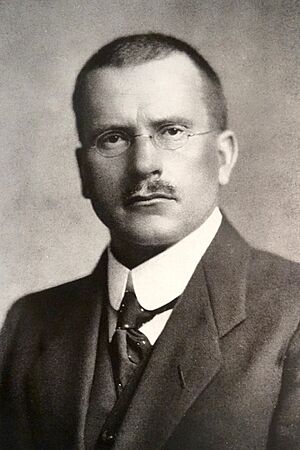Analytical psychology facts for kids
Analytical psychology, also known as Jungian psychology, is a way of understanding the human mind. It was started by a Swiss doctor named Carl Jung. This type of psychology looks at how each person's mind, or psyche, works. It also focuses on a journey to become a complete and true version of yourself.
Jung's ideas are different from psychoanalysis, which was created by Sigmund Freud. Both are types of psychotherapy, which is like talking therapy to help people.
Jung believed that a big part of our mind is hidden from us. This hidden part is called the unconscious. He thought that talking between our conscious (what we know) and unconscious (what we don't know) minds is very important. This helps us feel whole and balanced.
Contents
Understanding Jungian Psychology
Analytical psychology explores many interesting ideas about the mind. These ideas help us understand ourselves better.
What is the Unconscious Mind?
Jung divided the unconscious mind into two parts:
- The personal unconscious holds your own forgotten memories and feelings. It's like a secret storage space for your personal experiences.
- The collective unconscious is a deeper part. It holds ideas and patterns that all humans share. These are common to everyone, no matter where they live or what their life is like.
Exploring Archetypes and Symbols
The collective unconscious contains archetypes. These are like universal patterns or characters. They show up in stories, myths, and dreams from all over the world. For example, the "hero" or the "wise old person" are archetypes.
Symbols are also very important in Jungian psychology. They are images or ideas that have deeper meanings. Symbols can come from your personal experiences or from the collective unconscious. They often appear in dreams and help us understand hidden messages from our mind.
Becoming Your True Self: Individuation
Individuation is a key idea. It means becoming the unique person you are meant to be. It's a journey of self-discovery. This journey helps you bring together all parts of your personality. It includes both your conscious and unconscious sides. When you individuate, you become more whole and authentic.
Other Important Ideas
- Complexes are groups of feelings, thoughts, and memories. They are often connected to a specific idea or experience. For example, a "power complex" might mean someone is always thinking about being in charge.
- The persona is like a mask we wear in public. It's the part of ourselves we show to the world. It helps us fit in and interact with others.
- The shadow is the part of us we hide or don't like. It holds our less desirable traits or feelings. Jung believed it's important to understand and accept our shadow.
- The anima and animus are inner male and female parts. The anima is the feminine side in men. The animus is the masculine side in women. Jung thought balancing these inner parts helps us become more complete.
- The Self is the most important archetype. It represents the whole person. It's the goal of individuation, bringing all parts of the psyche together.
Images for kids
-
Still talking, Jung with psychoanalytic colleagues. Front row, Sigmund Freud, G. Stanley Hall, Carl Jung. Back row, Abraham Brill, Ernest Jones, Sándor Ferenczi. 1909 in front of Clark University.
-
Psychology of the Unconscious (1916), the book which precipitated Jung's break with Freud
-
The C.G. Jung Institute in Kusnacht, Switzerland
-
Main critics of Analytical Psychology: seated from left to right: Sigmund Freud, Sándor Ferenczi (IPA-President 1918–19), Hanns Sachs; standing: Otto Rank, Karl Abraham (IPA-President 1914–18 und 1924–25), Max Eitingon (IPA-President 1925–32), Ernest Jones (IPA-President 1920–24 and 1932–49). photo 1922.
-
Aurora thesaurusque philosophorum 1577 title page of a work by Paracelsus, studied by Jung
See also
 In Spanish: Psicología analítica para niños
In Spanish: Psicología analítica para niños
 | Valerie Thomas |
 | Frederick McKinley Jones |
 | George Edward Alcorn Jr. |
 | Thomas Mensah |









